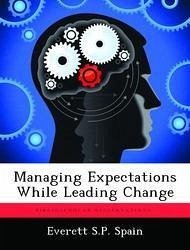First Place Winner of the MacArthur Military Leadership Writing Competition for the CGSC Class of 2006-001. Secretary of the Army Francis Harvey challenged our CGSOC class to "continually make your units better". To be able to lead change well, the leader must consider not just their own abilities, but also the situation and their stakeholders (including their subordinates). Change is isn't easy and real change takes time, so managing the expectations of your stakeholders is infinitely important if you want them to be a productive part of the change process and not just a subject of the change effort or a resistor to it. This paper argues that managing expectations is a critical factor in leading successful change. It goes on to provide ideas for choosing who your key stakeholders are, a four-part definition of managing expectations, twelve applicable lessons learned about managing expectations, a framework for analyzing what level and context of expectations management a leader should focusing on, and a case study of a wise expectation managers at innovative high school in the Bronx. The author's experience leads him to believe that many organizational leaders see leadership and its more specific subsets of leading change and managing expectations as primarily uni-directional influence attempts and not complex two-way processes. To lead significant change in the future in our units and in cultures that our organizations attempt to affect, we leaders will have to change our view of managing expectations from a simple perspective of "getting the message out" to seeing it as complex system of conscientious and consistent communication mechanisms that evolve as the situation develops in order to reinforce the relationship between the leader and their stakeholders.
Hinweis: Dieser Artikel kann nur an eine deutsche Lieferadresse ausgeliefert werden.
Hinweis: Dieser Artikel kann nur an eine deutsche Lieferadresse ausgeliefert werden.








